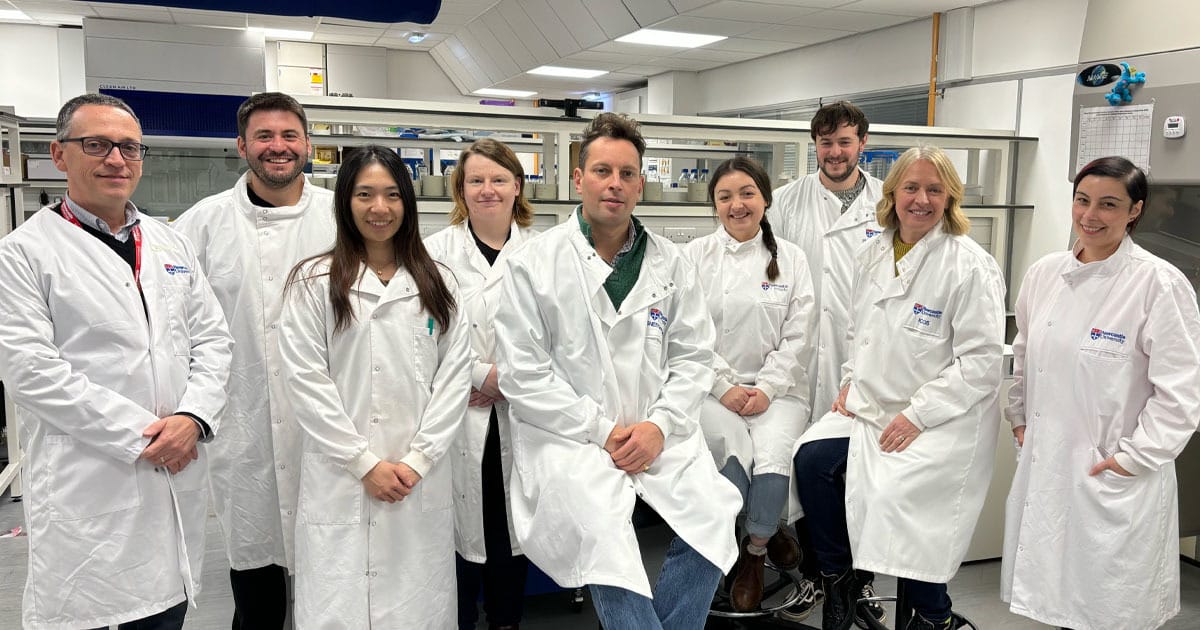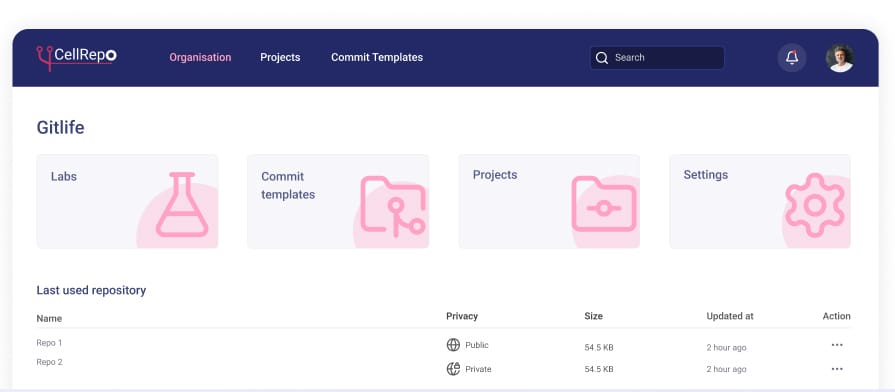- PreSeed Now
- Posts
- GitHub, Adobe, Amazon... and a passport, for the biotech industry
GitHub, Adobe, Amazon... and a passport, for the biotech industry
GitLife Biotech has big plans to support bioengineering R&D

We like to bring you startups EARLY at PreSeed Now, like the prelaunch startup we introduced you to on Tuesday.
One of the earliest deep tech startups we’ve ever profiled was GitLife Biotech. I remember waiting for last-minute confirmation that the university spinout process was going ahead before I could publish. It came through just in time!
That was in November 2022, and as is the case with a lot of startups of this kind, they’re still at an early stage, even though they’ve made a lot of progress. So let’s catch up with them and see where they’re up to…
Premium subscribers get the full story.
They also get access to our full back catalogue of startup and investor profiles, plus our PreSeed Now Startup Tracker, with a searchable index of all of our 250+ early-stage startups and updates on their progress. Oh, and they support PreSeed Now’s valued work in the early-stage startup world while they do it! 🙏
Join them👇
– Martin
GitLife Biotech wants to be GitHub, Adobe, Amazon (and a passport) for synthetic biology

The GitLife Biotech team
GitLife Biotech wants to transform how biotech works, by bringing a GitHub-like approach to R&D.
When we first profiled the company in November 2022, on the day their spinout from Newcastle University was approved, we wrote:
Synthetic biology is a field that produces highly valuable IP, but securing that IP isn’t straightforward. You can patent it, but then you have to give away the details of your secret sauce, which isn’t the best idea when you’re still perfecting it. GitLife Biotech (so new it doesn’t have a website to link to yet) thinks it's come up with the solution.
The Newcastle-based startup has two parts to its product: a GitHub-style software platform called CellRepo to provide for version control for genetic engineering development work, and a unique marker that goes into the synthetic DNA, linking it to the appropriate repository in CellRepo.
The real innovation here, says CEO George Neville-Jones, comes from the algorithm that uses data stored on CellRepo to create a unique ‘barcode’ that can be inserted discretely into the biological asset itself. Think of it like a security tag in the DNA.
Since then, a lot has happened. To find out how they’ve progressed, and what they’ll be up to next, I spoke to the company’s CEO, Beatrix Ellis, who was appointed late last year.
This conversation has been edited for clarity.
MB = Martin SFP Bryant, BE= Beatrix Ellis
MB: Last time we spoke to GitLife Biotech, the company had only just started the spinout process from Newcastle University. What has happened since?
BE: Since then, we've become a real company, and properly got all the systems in place. A CEO, Alastair Orr Ewing, was brought in, and he set up the company, set up all the systems, and got it going. They raised money, and also raised some Innovate UK funding to do proofs-of-concept.
And that's really been the focus of the last two years, advancing the platform and developing this proof of concept. And then about a year ago, Alastair decided he really needed more biotech commercial expertise in the company, and decided to bring in a CEO who could do that.
So I stepped in at the end of last year, and he stayed on as COO, with that operational background that he had already been bringing into the company. And we still have the original founders, Natalio Krasnogor and Leanne Hobbs, as well.
And so now the company is really poised for growth. We've got a proof-of-concept; it has been demonstrated that our product works; we've got a digital platform built, and now we're ready to really establish ourselves commercially.
MB: Back in November 2022, the big idea behind the company was version control and security barcoding of synthetic biology products via a hybrid software and biotech approach. How have things evolved since then?
BE: The product definition is still there, it's just what it unlocks that is maybe slightly different and more visible now.
Yes, our digital platform is for version control, very much like GitHub for biology, and we offer barcoding as a proof of ownership within engineered biology. With those two things, you now have really good proof of provenance, a full history of the development, and you have proof of ownership. These things are really lacking for making engineered biology manageable, making it traceable, secure, verifiable, and licensable, so it actually can be used.
Software used to be the Wild West. Code was being written with no real proof of ownership, and no real proof of who needed to be paid when it was used. Digital rights management tools and GitHub managed to solve those issues, and that's what GitLife is about: solving the ownership and traceability of engineered biology, which is now, as we all know, exploding.
What we want to do is bring in five different layers of an innovation stack, offering version control and AI-driven tools all on a platform that also allows you to collaborate with people.
We have proof of ownership through the barcoding–we sometimes call it ‘Adobe for biology’–you'll see a theme going through here very soon. And we are offering a marketplace, making sure that biological assets can be discovered, engineered, exchanged and sold, which is really difficult at the moment. There are freezers full of strains that can never actually be monetised. We want to change that as the ‘Amazon for biology.’
With proof of ownership comes the bio asset registry, a global registry for engineered biology, so we can trace it back to the source. We call it a ‘passport for biology’.
In the future, I could take a sample of water and put a microbe in there so you could see who developed it, what it is, if it's dangerous or not.
We’re not doing much with regulatory compliance at the moment, but there's more regulation coming within biology, and our systems are there to help find a way to do it, to give people more confidence in engineered biology.

GitLife Biotech’s CellRepo software
MB: How far are you to launching all of this, and what is your route to market?
BE: Version 2 of our CellRepo platform is just getting some final tweaks and will be released over the summer, which we're really excited about. It's much more user-friendly than the first version was.
That's all ready to go. It’s a SaaS platform with a standard ‘sign up and pay for what you use’ approach. And you get the version control, which is the key thing here, and the collaboration. That's the main thing that nobody else can provide; the secure overview of where you're collaborating, who with, and what they're working on.
The barcodes have been generated for seven different microorganisms–the seven most commercially relevant ones–and we're always adding more to that on a continuous basis. We've inserted them, and we've demonstrated that they don't impact the performance. These can either be offered digitally or through a DIY kit, where we give you a cassette that you just have to insert with the antibiotic resistance, etc. Or we can do it in house, so it's either a digital solution or a service solution, depending on the capabilities of our customers.
That's all ready to launch and is already being provided to customers. As for the marketplace, we are starting to upload libraries into our system. It's available now, but not necessarily with an ecommerce view. The ecommerce will be added in the next 12 months.
And then there’s the biotech asset registry. Every barcode that gets added is, of course, registered in our system. Over the next 12 months we will make this more broadly searchable.
Read on to find out:
GitLife Biotech’s funding and investment plans
Their vision for the future of the company
The challenges they’re gearing up to face
The competitive landscape they face

Subscribe to Premium to read the rest.
Become a paying subscriber of Premium to get access to this post and other subscriber-only content.
Already a paying subscriber? Sign In.
A subscription gets you:
- • Full profiles of early-stage startups every Tuesday & Thursday: go deeper on each startup
- • Access to our acclaimed Startup Tracker database of early-stage UK startups